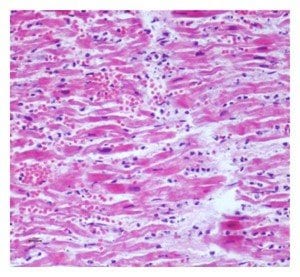 A recent study suggests that significant accumulation of calcium buildup in coronary arteries could be a signal of an impending heart attack in individuals who have metabolic syndrome and diabetes.
A recent study suggests that significant accumulation of calcium buildup in coronary arteries could be a signal of an impending heart attack in individuals who have metabolic syndrome and diabetes.
The study analyzed data from 6,600 people age 25 to 84; it was conducted by the UC Irvine Heart Disease Prevention Program.
The findings of the study showed that while 16% of the participants had been diagnosed with diabetes — mostly Type 2 diabetes — an additional 25% of the patients had metabolic syndrome, a series of disorders that is often a precursor to diabetes and heart disease.
“Our study points out that there’s a wide range in risk for cardiovascular consequences seen in persons with metabolic syndrome and diabetes and that screening of coronary calcium by heart scans – and, to a lesser extent, carotid arteries by ultrasound – may be helpful in picking out those most vulnerable,” says Nathan Wong, a professor of medicine at UC Irvine and director of the Heart Disease Prevention Program. Dr. Wong was also senior author on the study.
“Our findings also suggest that individuals with significantly high levels of coronary calcium or carotid wall thickness should receive more aggressive monitoring and treatment for any associated risk factors,” said Dr. Shaista Malik, co-author on the study and a cardiologist at UC Irvine.
The buildup up plaque in the arteries is called atherosclerosis. Such arterial plaque is composed of a variety of substances, including calcium, cholesterol, fat, and other materials found in the bloodstream. In patients with atherosclerosis, plaque hardens over time and causes a narrowing of the arteries that restricts the flow of blood to the organs and elsewhere throughout the body. As plaque buildup can develop in any artery in the human body, it can cause different negative effects depending on which artery is restricted.
The most common effect of calcium buildup in the arteries is coronary heart disease (CHD), the number one killer of adults in the United States. The buildup of plaque in the coronary arteries causes CHD; the narrowing of the arteries means that the heart receives less blood, and increases the likelihood of blood clots forming in the arteries, which can completely block blood flow through an artery. Such blockage of blood flow in the coronary arteries can cause angina — pain in the chest — or even heart attacks.
Some other complications that can arise from the buildup of arterial calcium include carotid artery disease, peripheral arterial disease, and chronic kidney disease.
Atherosclerosis is known to cause heart attacks, strokes, and death. While the exact cause of the buildup is unknown, risk factors such as a lack of exercise, smoking, poor diet, and a family history of heart disease can contribute to the development of atherosclerosis.
Arterial calcium buildup has been previously studied in the Multi-Ethnic Study of Atherosclerosis (MESA), which was funded by the National Heart, Lung, and Blood Institute division of the National Institutes of Health. Previous studies had shown that buildup of arterial calcium was associated with a greater risk of heart disease in Caucasians, but the MESA study conducted in 2007 showed that the same was true of other ethnic groups, including African Americans, Hispanics, and Chinese.
The MESA study analyzed data from 6,814 individuals, both men and women, who had no history of heart disease from coronary calcium. The study followed those individuals for 3.5 years on average.